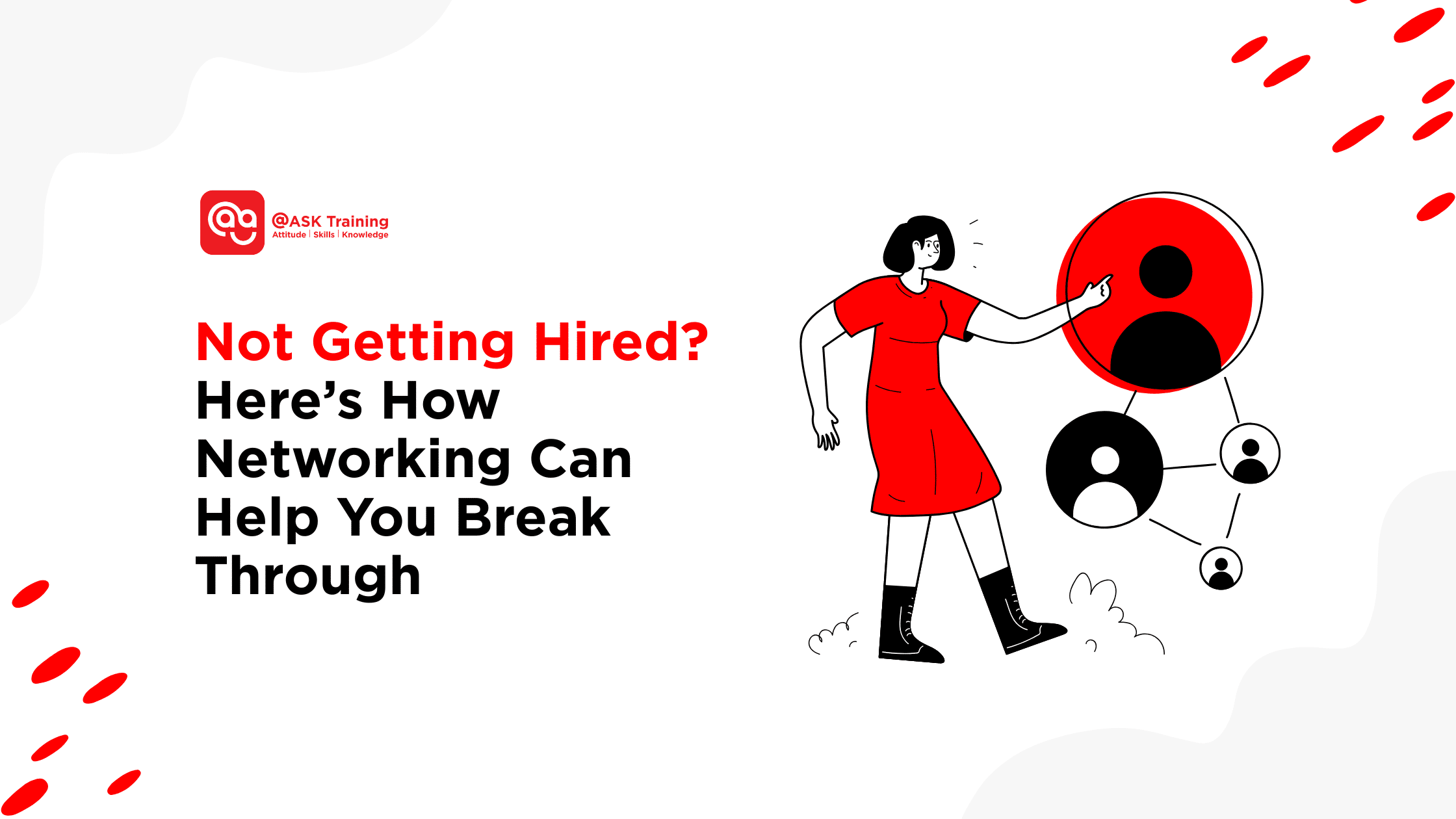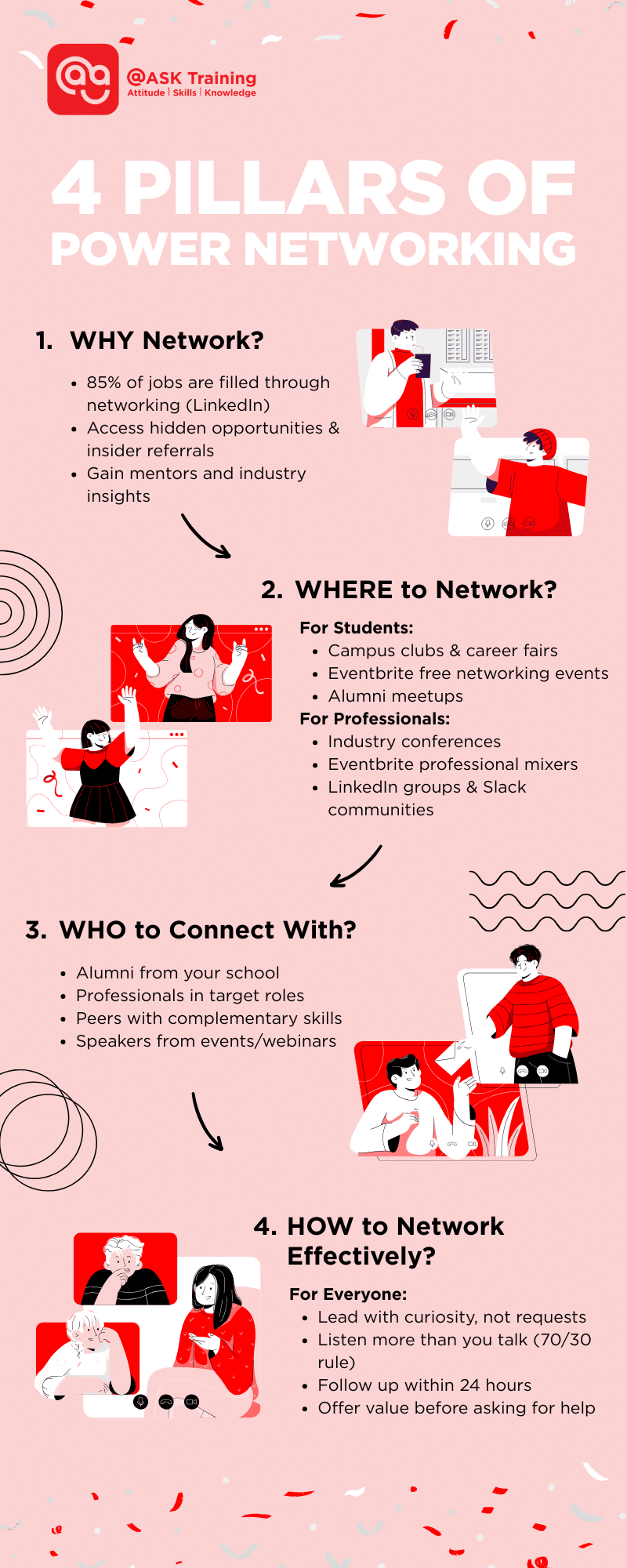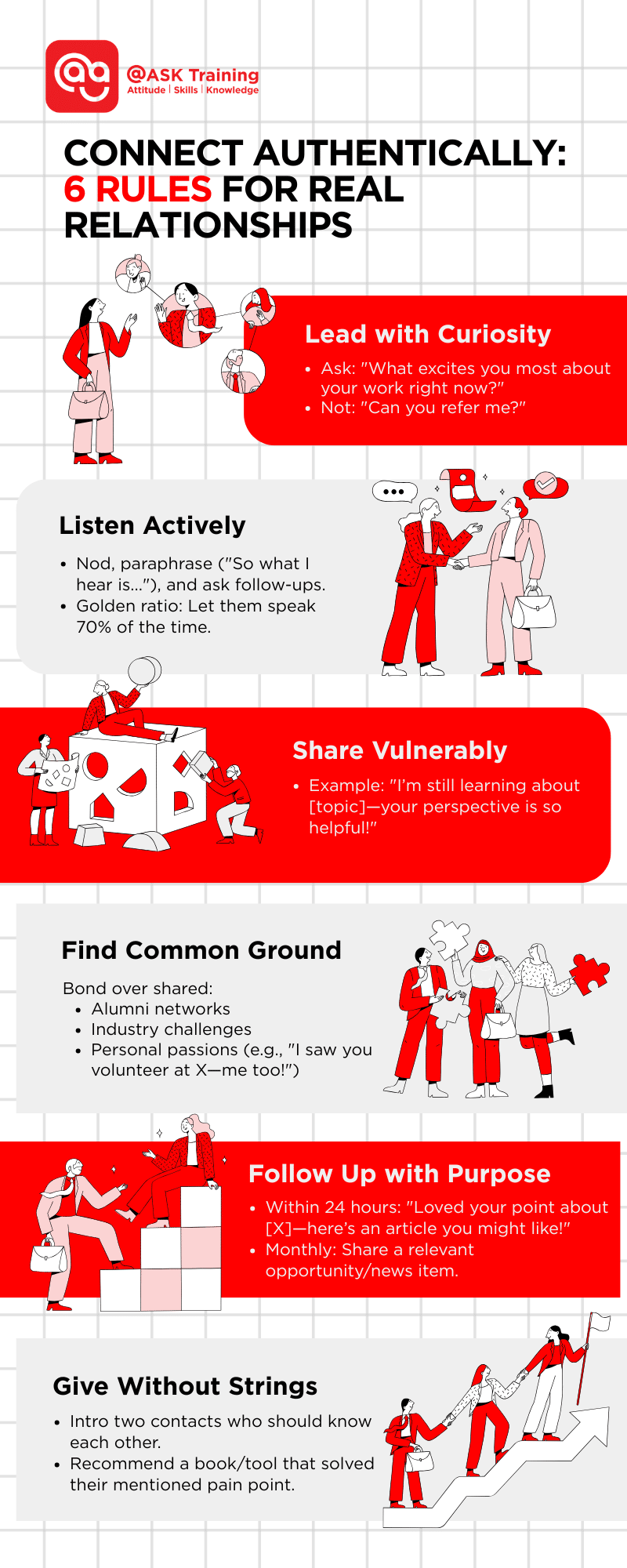In today’s competitive job market, sending out countless applications often isn’t enough. If you’re wondering why you’re not landing interviews or offers, the missing piece might be networking.
But networking isn’t just “who you know”, it’s about how you intentionally build and nurture professional relationships that can lead to valuable opportunities, insights, and support.
For students preparing to enter the workforce or mid-career professionals transitioning to a new field, networking for career change can be the bridge between where you are and where you want to be.
In this article, you’ll walk away with a clear, practical approach to using networking effectively during your studies or career change, from beginner strategies and real-world examples to using online platforms, conducting informational interviews, and building authentic, long-lasting professional relationships.
The Power of Networking in Career Development
Networking is a cornerstone of career advancement, and networking for job seekers is an essential strategy for uncovering opportunities and gaining a competitive edge.
It can lead to job referrals, mentorship opportunities, and insider information that’s rarely found on job ads.
- 85% of jobs are filled through networking, according to a survey by LinkedIn.
- Networking often leads to roles that are never publicly advertised.
- A recommendation from someone in your network can give you a substantial advantage over other candidates.
Real-world example: After attending a virtual industry webinar, Ana, a mid-career marketer transitioning to UX design, connected with a speaker on LinkedIn. That connection led to an informational interview, which turned into a contract role and eventually a full-time offer.
So, what exactly is an informational interview?
An informational interview is a conversation, usually informal, where you speak with someone working in a field, company, or role you’re interested in.
Unlike a job interview, the goal isn’t to get hired but to gain insights, advice, and clarity about a particular career path.
It’s a low-pressure way to learn more about an industry, expand your network, and sometimes, make a memorable impression that leads to future opportunities.
Before we explore further, here are the four main pillars of networking:
Now that you see networking’s power, let’s dive into strategies for students and how to build connections even before graduation.
Networking Strategies for Students
Starting to network early helps students build confidence, gain insights, and make connections that can ease their entry into the job market.
Here are some practical networking tips for students to start with:
- Join student organisations and clubs related to your interests or industry. These are great places to meet like-minded peers and connect with industry professionals who visit as guests or sponsors.
- Attend campus career fairs, guest lectures, and alumni networking events. These settings give you direct access to potential mentors, recruiters, and role models.
- Use your university’s career services to find networking events or connections to internship opportunities.
- Tap into alumni networks, reach out to recent graduates working in your desired field.
- Explore Eventbrite’s free networking sessions (e.g., “Young Entrepreneurs Circle”) to meet business owners beyond campus.
Beginner-Friendly Actions:
- Message a guest speaker after an event to thank them and ask a follow-up question (e.g., “How did your internship lead to your current role?”).
- Connect with classmates on LinkedIn after working together on a group project with a personalised note.
- Request a short call with an alumnus to learn about their career journey.
Pro Tip for Introverts:
Start small! Ask a professor or alumnus to share their career journey. Most people are happy to share their experiences when asked genuinely.
When students can lay a strong foundation through campus networks, mid-career professionals need to leverage existing connections.
Let’s explore how to reignite those relationships strategically.
Networking Strategies for Mid-Career Professionals
Career transition networking can be daunting, but your existing network is a valuable untapped asset.
1. Reactivate Existing Connections
Reconnect with former colleagues, managers, and clients, many are happy to help. Here’s how to do it right:
- Send a friendly, professional message: Reach out via LinkedIn, email, or even WhatsApp (if you had a casual relationship).
- Keep it simple: “Hi [Name], I came across [specific post/project] and wanted to reconnect hope you’ve been well!”
- Share an update or milestone: Open the door naturally: “I recently completed my certification in [X] and thought of your work in this space.”
- Comment meaningfully on their posts: If they’ve posted something recently like a promotion, article, or project congratulate or comment meaningfully. This shows genuine interest and reopens dialogue.
- Offer value before asking for anything: Share an article, tool, or resource they might find useful: “This made me think of your work on [project], thought you might find it useful!”.
- Suggest a low-pressure meetup: “Would you be open to a quick coffee chat? No agenda, just catching up!”
Reconnect around shared interests: Mention conferences, news, or mutual connections to reignite the conversation.
2. Expand Through Events
Attend webinars, industry meetups, or online courses where like-minded professionals gather.
Pro tip:
- Engage in chat/Q&A during events, your name will be remembered.
- Follow up within 24 hours: “Loved your point about [topic]—would love to continue the conversation!”
3. Outreach That Works
Use your outreach to express curiosity and intention, rather than just asking for a job. Example outreach message:
“Hi [Name], I’m transitioning into [new field] and admire your work in this space. I’d love to learn more about your path, would you be open to a 15-minute chat about your career path? Your insights would mean a lot!”
Once you’ve reignited connections, informational interviews become your secret weapon to explore new fields. Next, let’s discuss how to leverage them effectively.
Utilising Informational Interviews
Informational interviews are powerful tools that let you learn from people in your targeted field without asking for a job.
What They Are (And Aren’t)
These are casual, non-evaluative conversations where you speak with someone working in a role, company, or industry you’re interested in.
They’re not about asking for a job; they’re about learning, building rapport, and gaining insider perspectives.
These informational interviews can lead to mentorships, referrals, and even unexpected job opportunities over time.
How to Make the Most of Them:
1. Understand the Purpose and Approach
An informational interview is a learning conversation. The person you’re speaking with isn’t hiring you, they’re offering insight.
This means your role here is to be curious, respectful, and appreciative. You’re there to ask thoughtful questions, explore career paths, and understand how someone has achieved their current position.
Tip: Keep it brief (20–30 minutes), and let them know you’re just looking to learn, not asking for a job.
2. Find the Right People to Speak With
Start with your existing network. Alumni, former colleagues, mentors, or LinkedIn connections. Use search filters to find professionals with titles, industries, or companies that interest you.
Where to look:
- LinkedIn (especially your alumni tool and shared connections)
- University alumni directories
- Professional associations or meetup groups
- Guest speakers from webinars, podcasts, or industry events
3. Outreach and Questions
When you reach out, be polite and specific, prepare thoughtful, open-ended questions such as:
- “What does a typical day look like in your role?”
- “What skills helped you succeed when you first started?”
- “How did you transition into this industry?”
- “What trends do you see shaping your field?”
- “Is there anyone else you’d recommend I speak with?”
Avoid: “Do you have any job openings?”
Instead, Try This: “What skills would you prioritise for someone entering this field?”
Once you’ve gathered insights, the real magic happens in nurturing these connections. The next section goes into how to build relationships that last beyond one conversation.
Building and Maintaining Professional Relationships
Networking isn’t just about meeting people; it’s about nurturing genuine, long-term relationships that fuel your professional growth.
Whether you’re a student just starting out or a mid-career professional networking for career change, strong relationships are built on:
- Mutual respect
- Consistency
- The ability to offer value
Here’s how to stay connected authentically:
1. The Follow-Up Framework
- Within 24 hours, send a thank-you message after a conversation, it shows appreciation and keeps the door open.
- Stay in touch periodically (monthly/quarterly) by sharing updates, relevant articles, or a quick congratulations when you see good news.
- Congratulate promotions/work anniversaries with a personalised message.
2. Give to Get
Offer value before asking for help:
- Make introductions: “Jane, meet Alex—you both work in renewable energy!”
- Share opportunities: Job posts, events, or tools aligned with their goals.
- Lend expertise: Offer feedback on a project if you’re qualified.
3. LinkedIn Engagement Tips
Comment meaningfully on your connections’ posts to stay visible and engaged.
Share relevant content and add your insights to position yourself as thoughtful and informed.
Celebrate others’ milestones, like job changes or achievements, with a genuine note or reaction.
Pro Tip: Set a weekly 15-minute slot to engage with 5-10 connections. Consistency over volume.
Even with the best strategies, networking can feel daunting, especially if you’re introverted or new to an industry. Here’s how to overcome common challenges and build confidence.
Overcoming Networking Challenges
For many people, networking can feel uncomfortable, especially if you’re shy, introverted, or new to an industry. You might:
- Fear being a burden
- Worry about rejection
- Feel you lack value to offer
Good news: These hurdles are normal and surmountable. Here’s how to reframe them:
1. For Shyness or Social Anxiety
Start small. You don’t need to attend big events or speak in front of crowds. Try:
- One-on-one conversations, online messages, or small group meetups.
- Asking someone for 15 minutes of their time over coffee or Zoom is a low-pressure way to ease in and build confidence gradually.
- Comment on one LinkedIn post weekly with substance (e.g., “Your point about [x] resonates because…”)
Psychology Hack:
People remember how you make them feel, not your nerves. Most enjoy talking about themselves when asked genuinely.
2. For Imposter Syndrome
You might feel like you’re not accomplished enough to reach out but remember, everyone starts somewhere.
Let’s reframe that: You’re a learner, not a fraud.
Focus on learning rather than performing. Asking good questions and showing genuine interest is more valuable than having all the answers.
Script when reaching out:
“I’m early in my [field] journey and admire your work—would you share how you got started?”
3. For Fear of Rejection
It’s normal to worry about being ignored or turned down but don’t let that stop you. Not everyone will respond, and that’s okay.
Focus on the people who do engage, and don’t take silence personally. The more you reach out, the easier it becomes. Think of it as planting seeds, some will grow now, others later.
4. Shift Your Mindset
Instead of seeing networking as “asking for something,” think of it as building long-term relationships.
Strong professional networks are built on mutual support and trust over time. You’re not trying to land a job in one message, you’re creating opportunities for the future.
Power Question:
“How can I add value to this person’s day?” (Hint: Often, just listening is enough.)
Before we move on, here are 6 helpful tips to connect authentically:
Now that you’re equipped to tackle mental blocks, let’s turn to digital tools on how to leverage LinkedIn and online communities to network without leaving your desk.
Leveraging Online Platforms for Networking
Online platforms have made professional networking more accessible than ever. Whether you’re connecting with industry leaders across the globe or staying in touch with classmates and colleagues, digital tools can help you build a powerful network.
But to stand out and make meaningful connections, it’s important to be intentional with how you show up online.
1. Optimise Your LinkedIn Profile
Your LinkedIn profile is often your first impression, so make it count.
- Use a professional photo that reflects your industry and personal brand.
- Write a strong headline that goes beyond your job title. Use keywords that show your interests or goals (e.g. “Aspiring Data Analyst | Passionate about Turning Data into Insight”).
- Craft a compelling “About” section. Share your goals, interests, and what you’re looking to learn or do next.
- Include relevant experience, projects, and skills, even if you’re early in your career or transitioning industries.
Pro Tip: Use LinkedIn’s “Open to Work” feature discreetly (visible only to recruiters if preferred).
2. Join and Engage in Online Communities
Look for digital communities that align with your goals. They can be goldmines for connections, ideas, and job leads.
- LinkedIn Groups: Find groups in your industry, school, or area of interest. Join the conversation by commenting on posts or starting your own.
- Telegram Channels: Telegram is popular among younger Singaporeans and offers various channels dedicated to job listings, internships, and networking. (e.g. SG Careers)
- Slack/Discord Communities: Many industries (tech, marketing, UX, etc.) have informal communities where people share jobs, events, and advice.
- Reddit Forums (subreddits): Subreddits like r/careerguidance or r/AskHR can be valuable for peer advice and anonymous questions.
Alumni Networks: Many universities offer exclusive online platforms or LinkedIn groups where students and alumni can connect.
3. Attend Virtual Events and Webinars
Virtual events break down geographical barriers and make it easy to meet people in your field.
Before:
- Look for webinars, panel discussions, and industry talks hosted by professional associations, universities, or companies.
During:
- Engage during the event by asking thoughtful questions in the chat or reacting to others’ insights.
After:
- Follow up after the event: Connect on LinkedIn and reference the session (e.g. “Hi [name], your take on [topic] during the webinar was eye-opening, would love to connect!”).
4. Be Proactive (Without Being Pushy)
- Don’t wait for people to find you, reach out to those whose work you admire or who work in roles you’re interested in.
- Send a personalised message when you connect. Mention a shared interest, event, or reason for reaching out.
- Stay active by posting or engaging weekly, comment on industry news, share resources, or celebrate others’ achievements. Visibility leads to opportunity.
Next Steps You Can Apply Immediately:
Weekly Habit:
- Comment on 2 posts (add insights, not just emojis).
- Share 1 article with your perspective.
Outreach Template:
“Hi [Name], Your work on [project] inspired me, especially how you [detail]. Would love to learn more!”
Bottom line: Whether you’re introverted or outgoing, early-career or mid-career, online platforms are powerful tools for networking.
With a clear profile and consistent engagement, you can connect with people who can support, guide, and inspire your career journey.
Wrapping Up
Networking is more than just a job search strategy; it’s a long-term investment in your career development.
Whether you’re a student laying the foundation or a professional transitioning to a new field, the right connections can offer clarity, opportunity, and support.
You’ve learned that it’s not just about who you know, it’s about genuine, ongoing connection and the value you can bring to others as you grow.
From joining student clubs to attending industry webinars, from conducting informational interviews to engaging on LinkedIn, there are clear, practical steps you can start taking today, regardless of where you are in your journey.
Key takeaways:
- Networking leads to referrals, insight, and growth.
- Students and professionals alike can build strong networks with consistent, intentional action.
- Informational interviews, online platforms, and authentic follow-ups are essential tools.
- Overcoming fear and building relationships takes time, but it’s worth the effort.
Your Action Plan:
1. Pick one strategy to try this week:
- Send one LinkedIn message to an alumnus.
- Comment on one industry post with insight
2. Further Reading:
Video: The Best Way to Reach Out on LinkedIn Without Being Salesy
This video discusses common mistakes people make when reaching out on LinkedIn and provides tips on how to approach outreach more effectively.
Article: An Introvert’s Guide to Networking by Harvard Business Review
This piece discusses how introverts can leverage their strengths to build meaningful professional relationships. Tennessee Tech University
Article: The Introvert’s Guide to Building a Network by Sarah Michelle
This article shares insights on how introverts can curate a community and the importance of networking.
Article: 40 Questions to Ask in an Informational Interview by University at Buffalo.
This resource provides a comprehensive list of questions to guide your informational interviews.
Article: 30 Questions To Elevate Your Informational Interview by Indeed
This article offers a curated list of questions to help you gain valuable insights during informational interviews.
Start small, stay consistent, and remember: every conversation is a step forward.
Ready to Expand Your Network?
Start by building your network! Join us and explore our upcoming events and webinars for opportunities to connect and learn. Visit our Events Page for more information.
If you’re looking to gain skills and confidence to transition into your next role, @ASK Training’s Career Services & Resources Support (CARES) Programme offers a variety of resources to empower mid-career professionals like yourself to navigate career transitions.
From career workshops to job seeker-related events, visit our Career Services page today to explore more!
Related Courses
- Create Your Personal Brand
- Master Your Message with Powerful Body Language
- The Art of Conversation Mastery
◆◆◆
Related Articles
Article Topics
- The Power of Networking in Career Development
- Networking Strategies for Students
- Networking Strategies for Mid-Career Professionals
- Utilising Informational Interviews
- Building and Maintaining Professional Relationships
- Overcoming Networking Challenges
- Leveraging Online Platforms for Networking
- Wrapping Up



